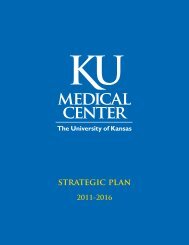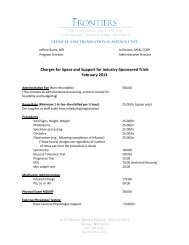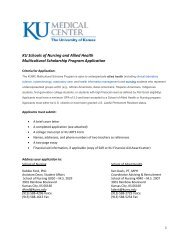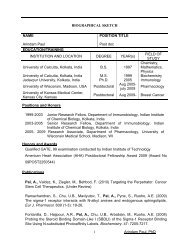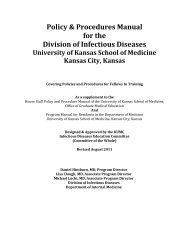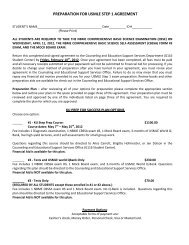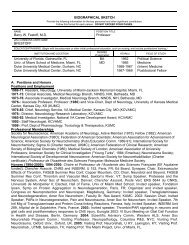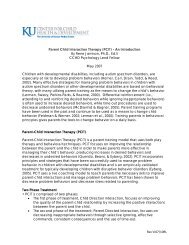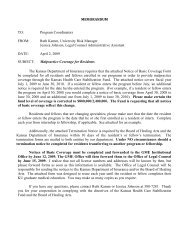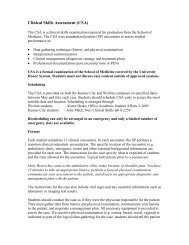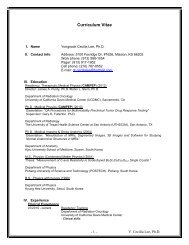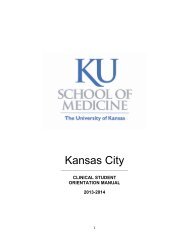Changing for Excellence - University of Kansas Medical Center
Changing for Excellence - University of Kansas Medical Center
Changing for Excellence - University of Kansas Medical Center
You also want an ePaper? Increase the reach of your titles
YUMPU automatically turns print PDFs into web optimized ePapers that Google loves.
<strong>University</strong> <strong>of</strong> <strong>Kansas</strong> <strong>Medical</strong> <strong>Center</strong><br />
<strong>Changing</strong> For <strong>Excellence</strong><br />
Town Hall Meeting<br />
July 5, 2011<br />
1<br />
© Huron Consulting Group Inc. All rights reserved. Huron is a management consulting firm and not a CPA firm, and does not provide attest services, audits, or<br />
other engagements in accordance with the AICPA’s Statements on Auditing Standards.
Discussion points<br />
The purpose <strong>of</strong> today’s meeting is to communicate project scope, objectives<br />
and approach and solicit input regarding project expectations and outcomes.<br />
• Introductions and project organization<br />
• Project stewardship and communications<br />
• Scope and objectives<br />
• Approach, timeline, and deliverables<br />
• Progress to date<br />
• Potential issues <strong>for</strong> consideration<br />
• Next steps<br />
• Questions<br />
2
Introductions<br />
Huron Consulting<br />
Project Leadership:<br />
John Curry<br />
Shandy Husmann<br />
Mike Phillips<br />
Kathleen Shaw<br />
Project Delivery:<br />
Shabaki Lambert<br />
Marc Bonarigo<br />
Floyd Barnett<br />
Patrick Higley<br />
Mike McClatcher<br />
Subject Matter Experts<br />
Robert Hascall, Facilities<br />
Marlon Lynch, Public Safety & Security<br />
Derek Smith, Procurement<br />
Judy Thorp, Human Resources<br />
<strong>University</strong> <strong>of</strong> <strong>Kansas</strong> <strong>Medical</strong> <strong>Center</strong><br />
Project Advisory Committee<br />
Jim Bingham<br />
Marge Bott<br />
Jim Cooper<br />
Winnie i Dunn<br />
Sam Enna<br />
Debbie Ford<br />
Shelley Gebar, Committee Chair<br />
Rick Johnson<br />
Mike Keeble<br />
Greg Kopf<br />
Chris Lyon<br />
Chris McCracken<br />
Kim Meyer<br />
Tyann Orton<br />
Ed Phillips<br />
Don Rau<br />
Steffani Webb<br />
3
Scope and objectives<br />
KU is seeking administrative cost savings and revenue enhancement<br />
opportunities.<br />
In-scope functions<br />
• In<strong>for</strong>mation technology<br />
• Accounting and finance<br />
• Procurement<br />
• Public safety<br />
• Student services<br />
• Human resources<br />
• Business services<br />
• Facilities operations<br />
• Design and construction services<br />
• Research administration<br />
• Auxiliaries<br />
Objectives<br />
• Reduction <strong>of</strong> operating costs through more<br />
efficient use <strong>of</strong> the <strong>University</strong>’s infrastructure<br />
• Identification <strong>of</strong> cost-reduction, revenueenhancement<br />
and service-improvement<br />
opportunities<br />
• Evaluation <strong>of</strong> how effectively administrative<br />
and business support services are delivered<br />
• Evaluation <strong>of</strong> funding models currently used <strong>for</strong><br />
self-supporting supporting units<br />
• Identification <strong>of</strong> opportunities to reorganize and<br />
streamline the administrative infrastructure<br />
• Evaluation <strong>of</strong> cost saving ideas identified by<br />
the <strong>University</strong> in light <strong>of</strong> industry best practices<br />
• Creation <strong>of</strong> a roadmap to trans<strong>for</strong>m the<br />
<strong>University</strong> so that it operates effectively within<br />
the financial constraints that are expected over<br />
the next decade<br />
4<br />
The <strong>University</strong> is taking a proactive approach to strategic trans<strong>for</strong>mation <strong>of</strong> administrative services to<br />
identify resources to fund strategic initiatives.
Our Resource Optimization Project<br />
Principles<br />
Huron’s guiding principles are driven by our understanding that university administrative and<br />
service operations exist to support education, research, public service and patient care.<br />
Huron strives to develop recommendations that are:<br />
Context Dependent<br />
Impactful<br />
Data Driven<br />
Initiatives must be<br />
identified and prioritized<br />
in a manner that is<br />
sensitive to the<br />
culture and mission <strong>of</strong><br />
each hthe <strong>University</strong><br />
it<br />
Potential reductions and<br />
reallocations will be<br />
judged on the basis <strong>of</strong><br />
alignment with the<br />
<strong>University</strong>’s strategic<br />
priorities<br />
Cost reductions in<br />
one area should not<br />
shift costs to another<br />
since this does not<br />
generate any net<br />
financial i benefit and<br />
may create a<br />
competitive, rather than<br />
collaborative, culture<br />
Revenue generation<br />
options should be<br />
developed where<br />
feasible to mitigate<br />
potentially excessive<br />
expense reductions<br />
Proposed initiatives<br />
should be supported<br />
by business cases<br />
which are data driven<br />
and comprehensive<br />
The revenue impact <strong>of</strong><br />
cost reductions must<br />
be understood and<br />
estimated to the degree<br />
possible.<br />
5<br />
All decision processes and criteria should be transparent and communicated clearly and<br />
systematically to all parties, including administration, faculty, staff, and other affected<br />
stakeholders.
Project organization – Huron team overview<br />
Each campus will have a dedicated project delivery team and the teams will<br />
work collaboratively to identify opportunities across campuses.<br />
Project<br />
Leadership<br />
Project Leader:<br />
John Curry<br />
Project Director:<br />
Mike Phillips<br />
KU Team 1 KU MC Team 2<br />
Shandy Husmann<br />
Principal Project Advisor<br />
Procurement Specialist Team<br />
Wendy Meister<br />
Kathleen Shaw<br />
Derek Smith<br />
Project<br />
Delivery Team<br />
Megan Cluver<br />
Shabaki Lambert<br />
Marc Bonarigo<br />
Floyd Barnett<br />
Mike McClatcher<br />
Pete Fritz<br />
Patrick Higley<br />
6<br />
Subject<br />
Matter<br />
Advisors<br />
Kevin Mack<br />
• Judy Thorp, Human Resources<br />
• Marlon Lynch, Public Safety and Security<br />
• Robert Hascall, Facilities<br />
Notes: (1 )Including Main Campus and Edwards; (2) Including <strong>Kansas</strong> City and Wichita.
How Huron will partner with the university<br />
Leveraging university engagement and actively involving stakeholders helps<br />
to build consensus and promote sustainable change.<br />
Huron<br />
<strong>Kansas</strong><br />
Huron Project<br />
Leadership<br />
• John Curry<br />
• Shandy Husmann<br />
• Mike Phillips<br />
• Multi-Team<br />
Subject Matter<br />
Experts<br />
KU Team<br />
Steering<br />
Committee<br />
Executive Sponsor<br />
Project<br />
Coordinator<br />
• Provide guidance and support<br />
• Review executive summary <strong>of</strong> business<br />
cases<br />
• Discuss key findings and business cases<br />
• Consider summary-level updates on issues<br />
• Vet implementation timetables and<br />
milestones<br />
• Manage timetables, milestones, interview<br />
scheduling, and data request fulfillment<br />
• Facilitate resolution <strong>of</strong> issues<br />
• Review detailed progress reports/updates<br />
KUMC Team<br />
Subject Matter Expert<br />
Kathleen Shaw<br />
Procurement Team<br />
Subject Matter Expert<br />
Derek Smith<br />
Workgroups<br />
• Champion<br />
• Stakeholders<br />
• Participate in interviews<br />
• Fulfill data requests<br />
• Vet business cases<br />
7<br />
KU & KUMC engagement in the project will help to promote organizational buy-in and create a framework <strong>for</strong><br />
sustainable change.
Project stewardship and communications<br />
Project stewardship is grounded in strong communications and knowledge<br />
sharing between Huron and KUMC.<br />
Committee/Group Roles Meeting Frequency<br />
Executive Steering<br />
Committee<br />
KUMC Advisory<br />
Committee<br />
Project Sponsor &<br />
Coordinator<br />
Project Leadership<br />
• Provide overall project guidance and<br />
direction<br />
• Approve/make decisions<br />
Project Stewardship<br />
• Review project status<br />
• Provide institutional insight and guidance<br />
• Validate findings and vet<br />
recommendations<br />
Project Management<br />
• Manage project and coordinate resources<br />
• Make/obtain management decisions<br />
• Vet/validate data and assumptions<br />
• Escalate/resolve project issues<br />
• Bi-weekly<br />
• Bi-weekly<br />
• Weekly<br />
8<br />
Frequent communication between Huron and KUMC stakeholders facilitates ongoing knowledge sharing and provides<br />
project direction.
Overview <strong>of</strong> approach<br />
This engagement focuses on Phases I & II and will provide KUMC with<br />
business cases <strong>for</strong> implementation <strong>of</strong> selected opportunities.<br />
Phase<br />
I Launch Discover<br />
Analyze Identify<br />
Outcome<br />
“Menu” <strong>of</strong> Multiple<br />
Opportunities<br />
II Develop Communicate<br />
Plan<br />
Implementation-<br />
Ready Business<br />
Cases<br />
III Support Train Measure<br />
Implemented<br />
Improvements<br />
Staff Engagement<br />
Knowledge<br />
Transfer<br />
Change<br />
Management<br />
Project<br />
Management<br />
9<br />
At the end <strong>of</strong> Phase II Huron will provide KU & KUMC with ~10 business cases (across both campuses) that are<br />
selected from the menu <strong>of</strong> opportunities provided in Phase I.
Project timeline<br />
Phases I & II are anticipated to last approximately eighteen weeks.<br />
Project Timeline<br />
Week<br />
5/9 5/16 5/23 5/30 6/6 6/13 6/20 6/27 7/4 7/11 7/18 7/25 8/1 8/8 8/15 8/22 8/29 9/5<br />
Executive Committee<br />
KUMC Advisory<br />
Committee Steps<br />
1. Launch<br />
2. Discover<br />
3. Analyze<br />
4. Identify<br />
5. Develop<br />
6. Communicate<br />
7. Plan<br />
Phase I<br />
Phase II<br />
10<br />
In addition to bi-weekly Advisory Committee and Executive Steering Committee meetings, Huron meets weekly with<br />
the project sponsor <strong>for</strong> KUMC to provide status updates.
Phase II – business case development<br />
The development <strong>of</strong> the business cases requires a structured approach.<br />
11<br />
Business Case Development<br />
Process/<br />
Business Assessments<br />
Gaps & Solutions<br />
<br />
<br />
<br />
<br />
<br />
<br />
<br />
<br />
Further assess current operations including:<br />
– Acknowledged competencies<br />
– Core operating functions<br />
– Primary support functions<br />
Identify and evaluate recent trends in the area operating environment<br />
Review the sources and uses <strong>of</strong> resources with a focus on key drivers, including where<br />
appropriate:<br />
– Revenue (price & quantity)<br />
– Cost (fixed & variable)<br />
Benchmarking in<strong>for</strong>mation and data uncovered during Phase I are used to identify<br />
gaps and/or inefficiencies<br />
Potential opportunities to close the identified operational gaps are developed<br />
Qualitative assessments are made <strong>of</strong> each option to identify cultural and<br />
implementation considerations<br />
Recommendations are crafted to close the respective operating gaps<br />
Supporting analytics are used to determine the financial impact <strong>of</strong> each<br />
recommendation, including:<br />
– Relevant up-front cost and one-time benefits<br />
Cost / Benefit Analysis – Affiliated cost reductions<br />
– Incremental revenue enhancements<br />
<br />
Business Case Creation<br />
<br />
<br />
Aside from the financial implications, assessments are made in terms <strong>of</strong> service levels<br />
and risk exposures to further justify implementation<br />
Prior steps <strong>of</strong> analysis are synthesized into a complete business case providing a full<br />
description and a fact-based, data-driven rationale <strong>for</strong> change<br />
Business case deliverable components will include the current state assessment,<br />
strengths, benchmark data, recommendations <strong>for</strong> change, and benefits (financial,<br />
service quality, cultural, etc.)
Business case – example<br />
The business cases provide detailed, fact-based support <strong>for</strong> the opportunities<br />
identified.<br />
Illustrative Business Case<br />
Area / Department<br />
Overview<br />
Cost-Benefit<br />
Analysis ayss<br />
Benchmarking<br />
Menu List<br />
12<br />
The “menu” approach is expanded during the business case development phase to provide more precise estimates <strong>of</strong><br />
savings opportunities and institutional impacts.
Progress to date<br />
Huron, working with the KUMC project sponsor and Advisory Committee, is<br />
well along the Analyze path <strong>of</strong> this phase.<br />
• Communications<br />
– “<strong>Changing</strong> <strong>for</strong> <strong>Excellence</strong>” website<br />
– Project Charter<br />
– High-level communication plan<br />
• Data compilation<br />
– Initial data request submitted the week <strong>of</strong> April 18 th<br />
– KUMC established a SharePoint site to submit data<br />
– Huron has reviewed data initially submitted and has requested, received and reviewed<br />
additional in<strong>for</strong>mation<br />
• Leadership interviews<br />
– Huron has completed 110 interviews with leadership, faculty and staff on both the <strong>Kansas</strong> City<br />
and Wichita campuses<br />
– Additional interviews and follow-up meetings to vet data and test assumptions will continue to<br />
be scheduled as needed<br />
13
Benchmarking<br />
Huron worked with the Advisory Committee to identify a set <strong>of</strong> peer<br />
benchmarking schools <strong>for</strong> this project that relate to the <strong>Medical</strong> <strong>Center</strong>.<br />
• Identified peer institutions:<br />
– <strong>University</strong> <strong>of</strong> Maryland <strong>Medical</strong> School<br />
– <strong>University</strong> <strong>of</strong> Colorado School <strong>of</strong> Medicine<br />
– <strong>University</strong> <strong>of</strong> Iowa Roy J. and Lucille A. Carver College <strong>of</strong> Medicine<br />
– Indiana <strong>University</strong> School <strong>of</strong> Medicine<br />
– <strong>University</strong> it <strong>of</strong> Illinois i College <strong>of</strong> Medicine<br />
i<br />
– <strong>University</strong> <strong>of</strong> Nebraska College <strong>of</strong> Medicine<br />
– <strong>University</strong> <strong>of</strong> Mississippi School <strong>of</strong> Medicine<br />
• Criteria used included:<br />
– Hospital is separate from <strong>University</strong> and <strong>Medical</strong> School<br />
– <strong>Medical</strong> School is located at a distance from main <strong>University</strong> campus<br />
– Faculty practice plan functions under a federated model, and is a separate legal entity<br />
– Two or more medical school campuses<br />
– Four or more additional programs / schools <strong>of</strong> health pr<strong>of</strong>essions<br />
14
Questions & Answers<br />
What questions do you have? What in<strong>for</strong>mation haven’t we provided?<br />
Huron team contact in<strong>for</strong>mation:<br />
John Curry cell: 312-479-0085 email: jcurry@huronconsultinggroup.com<br />
Mike Phillips cell: 312-479-3265 email: mphillips@huronconsultinggroup.com<br />
Kathleen Shaw cell: 312-912-1404 email: kshaw@huronconsultinggroup.com<br />
Link to <strong>Changing</strong> <strong>for</strong> <strong>Excellence</strong> website:<br />
http://chancellor.ku.edu/changing<strong>for</strong>excellence/index.shtml<br />
15



